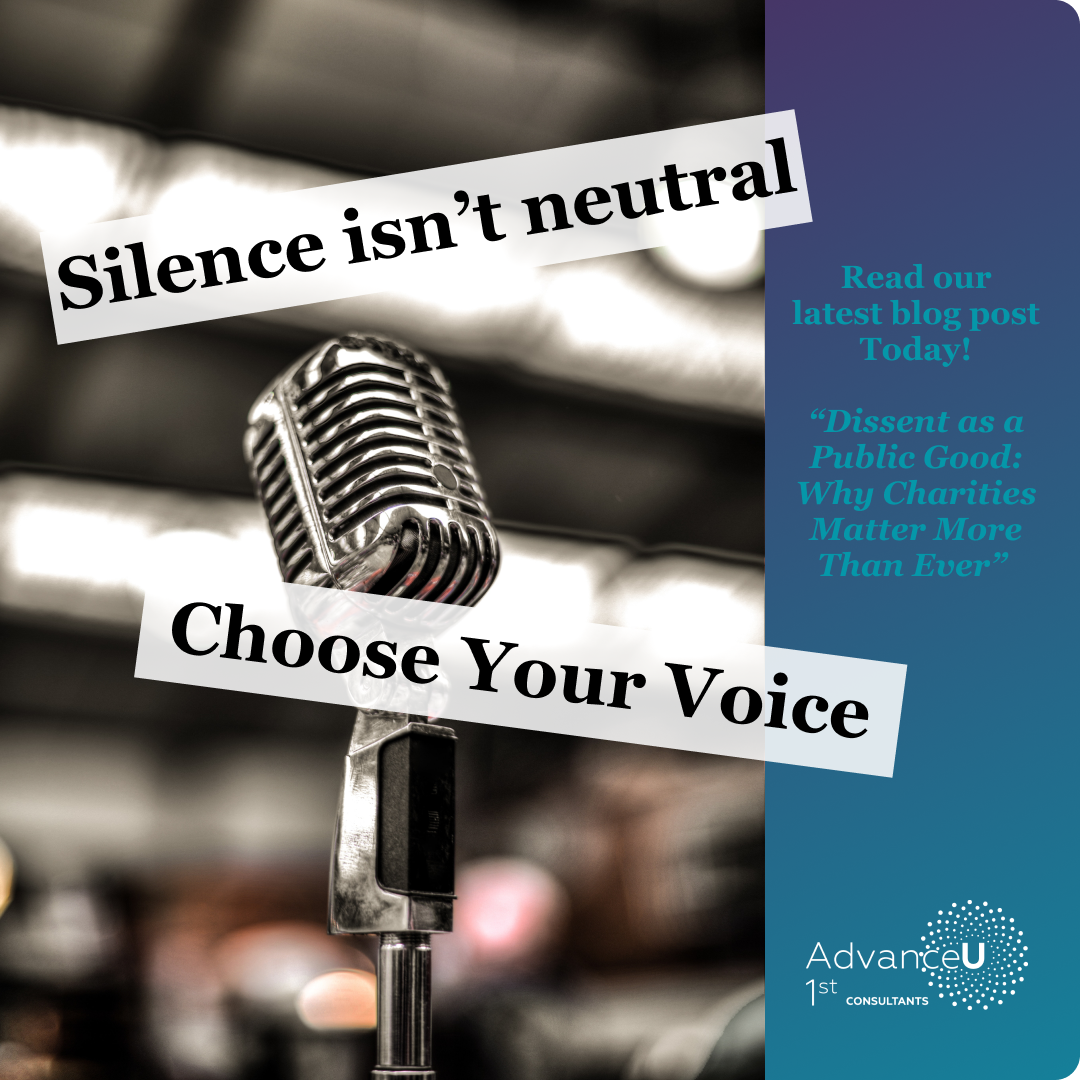Dissent as a Public Good: Why Charities Matter More Than Ever.
Dissent as a Public Good: Why Charities Matter More Than Ever
When Jerry Greenfield resigned from Ben & Jerry’s after nearly five decades, he wrote:
“It’s easy to stand up and speak out when there’s nothing at risk. The real test of values is when times are challenging and you have something to lose.”
Those words are a reminder that courage is not theoretical, it is tested when the stakes are high.
Here in Canada, dissent is not just a right. It is a responsibility and one of the key mechanisms that keeps democracy healthy. It prevents the tyranny of the majority, protects the rights of minorities, and forces society to face uncomfortable truths when it would rather look away.
Charities and non-profits play a critical role in preserving this space for dissent. They are often the first to see what happens when vulnerable communities are impacted by policy changes, economic downturns, or social neglect. They bear witness, gather stories, and give voice to those who would otherwise go unheard.
But right now, many of these organizations are not thinking about advocacy or capacity-building, they are simply trying to survive. Staff are stretched, funding is uncertain, and demand for services is climbing. In that environment, speaking out can feel like a luxury.
And yet, this is precisely when dissent matters most.
When governments pass policies that limit access to healthcare, education, or when social services are cut back in the name of “efficiency”, these organizations are on the front lines. They see the impact in real time. Their silence, whether by choice or necessity, leaves vulnerable Canadians without a voice.
That’s why protecting dissent is not only about rights, it is about resources. If we want charities to keep speaking up, we must support them in practical ways that fit today’s reality. So, what does action look like when charities are in survival mode?
Here are four practical ways dissent can be kept alive . . . even now.
- Charities: Use the Channels You Already Have
You don’t need a new advocacy budget to make an impact – just intentionality.
- Share short policy updates in your newsletters or social media.
- Tell anonymized stories that show the human impact of systemic issues.
- Ask board members and staff to amplify those stories through their networks.
- Charities: Collaborate for Strength
Advocacy is louder and cheaper when it’s collective.
- Add your name to joint letters or campaigns, coalitions often provide ready-made messaging.
- Host virtual roundtables or listening sessions with other groups serving the same community.
- Share volunteers or communications resources to reduce costs.
- Canadians: Give What You Can: Consistently
Even small, steady contributions make a difference.
- A $10 or $20 monthly donation provides stability for organizations that are otherwise living campaign to campaign.
- When you donate, choose unrestricted funds so charities can direct money to where it’s most urgently needed, including advocacy or staffing.
- If money is tight, give time: contribute to newsletters, write letters, or provide professional expertise.
- Canadians: Be a Voice, Not Just a Donor
Charities can’t carry the advocacy load alone.
- Share their posts, sign petitions, and talk about the issues in your networks.
- Write to your MP, MLA, or municipal leaders when you see decisions that harm vulnerable populations.
- Encourage your workplace, faith group, or community organization to support local charities through donations or matching programs.
The Bigger Picture
Supporting charities is about more than meeting immediate needs, it is about protecting Canada’s democratic health. When these organizations can speak out, they help ensure that no community is left invisible and that decisions reflect the needs of everyone, not just the majority.
Dissent is precious. If we allow it to fade through underfunding, exhaustion, or silence, we risk losing more than services. We risk losing the very mechanism that keeps our democracy honest.
Silence isn’t neutral, so choose your voice so no one else can.
If you are part of a charity or non-profit wondering how to sustain your voice in challenging times, we’d love to keep this conversation going. Our work is focused on helping organizations build capacity and resilience so they can keep doing what matters most, including advocating for the communities they serve. We are here to help.
Here’s a place to start:
- Ask yourself: Which issues keep me up at night? Which communities do I most want to see protected and heard?
- Find your match: Look for charities that work directly on those issues, especially those that are small, local, and deeply embedded in the communities they serve.
- Decide your level: Can you give money, time, or a platform? Even one of these makes a difference.
- Make it consistent: Whether it’s a monthly donation, a recurring volunteer shift, or simply sharing their message regularly, commit to showing up over time.
Democracy is sustained by people who don’t just care, they can act. And the good news is, you don’t have to do everything. You just have to start somewhere.
Our democracy depends on citizens like us who willing to speak, to listen, and to keep dialogue alive, especially when it’s uncomfortable. This conversation matters, and your perspective can help shape it. How will you use your voice to keep dissent a force for a better Canada?
This reflection was sharpened through many conversations and with the help of AI-assisted writing tools that pushed me to ask better questions.




No Comments